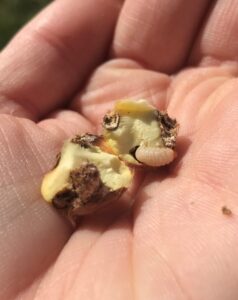Aug 7, 2024Michigan chestnut growers face weevil, weather challenges
Chestnut growers in Michigan are navigating pest management and weather variability as the season progresses, according to a report from Michigan State University (MSU) Extension.
WEATHER
Over the past month, Michigan experienced typical temperatures for this time of year, with variable precipitation. The southern Lower Peninsula saw above-average rainfall, while northwest Michigan and the Upper Peninsula experienced below-average precipitation.
The Lower Peninsula is about seven to 14 days ahead in growing degree days (base 50), ranging from just over 1,300 in the northwest to nearly 1,900 in the south. Medium-range forecasts suggest slightly below-normal temperatures and normal to above-normal precipitation, according to MSU’s crop update.
PEST MANAGEMENT
Lesser chestnut weevil

Growers are advised to scout for chestnut weevil activity, which typically begins in September. While adult beetles cause minimal harm, larvae can severely damage chestnut kernels. MSU research highlights the critical control window in September, but early scouting is essential. Effective monitoring includes using limb tapping techniques and ethanol-baited traps.
Asian chestnut gall wasp
This pest is active from late June to mid-August. Growers in the Lower Peninsula, particularly those west of Highway 127 and south of I-96, should scout for galls on branches or leaves. Young trees are especially vulnerable and may require pyrethroid insecticide treatments.
Black stem borer
Activity is winding down, but growers should trap to confirm emergence has ended before stopping trunk sprays. This pest targets stressed trees, creating tunnels that disrupt water and nutrient transport.
Japanese beetle
Adult beetles are currently feeding and can cause significant defoliation. Well-established orchards might not need full protection, but younger trees with limited leaf area require more aggressive management.
Potato leafhopper
High numbers this year have led to significant damage. Regular scouting is crucial, especially after rainstorms, to detect early infestations and prevent severe leaf damage.
European red mite
Populations were high in recent years, and growers should scout early for overwintering eggs and nymph activity. Maintaining beneficial mite populations can help control pest mites.
DISEASE MANAGEMENT
MSU Extension noted in its report that growers should avoid pruning chestnuts now to prevent infections like chestnut blight and oak wilt. Existing chestnut blight infections should be managed by pruning out affected branches and destroying infested material.
The full Aug. 1, 2024 chestnut crop report is available on MSU’s website.









